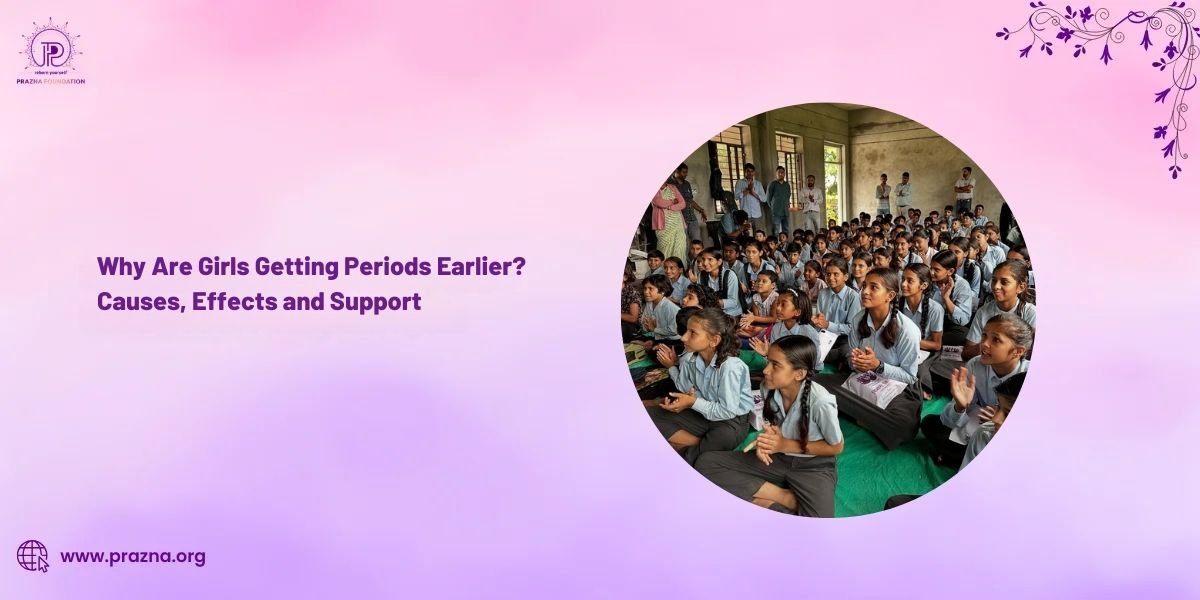Introduction
Menstruation is being recognized earlier, sometimes at the age of eight or nine. There has been a growing emphasis by parents, teachers, and healthcare NGOs to address this issue. This is important for the physical and mental health of the young girls. Parental support is a very important factor in helping children adjust to this early developmental change.
What is an Early Puberty?
Mostly between the ages of 9 and 13, girls come into puberty, with periods usually occurring at about 12 years of age. Early puberty implies that these changes-launching physical and hormonal developments-set in before the age of eight in girls.
Possible Causative Factors Behind Earlier Periods
1. Increased Body Fat and Obesity
An elevated level of body fat is a significant factor that can trigger menstruation at an earlier age. Fat tissue makes estrogen, and the more of this hormone may trigger an early onset of hormonal activity.
2. Exposure to Endocrine Disruptors
They are being said to be causing disturbances in hormones and speeding up the process of puberty; chemicals found in plastics, cosmetics, food containers, etc. (Fig: BPA, for instance).
3. Stress and Family Background
Research shows that chronic stress in a conflictual environment with absent parents or trauma could be instrumental in triggering early puberty. The body may interpret stress as a biological message to age more rapidly.
4. Diet and Nutrition
Another issue interfering with the functioning of natural puberty timing may be foods manufactured in factories, sugary treats, and hormone-treated animal foods.
5. Hereditary and Ethnicity Factors
If there is a history of early menstruation in girls in the family, there is a chance that girls will grow up to menstruate early. Another factor is ethnic background because certain ethnicities are on an average earlier puberty.
Effects of Early Periods on Girls
1. Physical Health Risks
Girls hitting the onset of menstruation early have some of these health problems posing a bigger risk to them.
- of polycystic ovary syndrome (PCOS)
- Type 2 diabetes
- Breast cancer
- Obesity in adulthood
2. Emotional and Mental Health
- Anxiety and depression might emerge during early puberty,
- Low self-esteem,
- Body image issues, and
- Social isolation or bullying.
Such modifications may transpire to be extremely trying, particularly if peer groups have not yet experienced puberty.
3. Academic and Behavioral Issues
Studies have found that early-developing girls could have more school difficulties and could also be at a higher risk of becoming involved in risky behavior.
How to Help a Girl Going Through Early Puberty
1. Open Conversations Again
Speak openly and honestly regarding puberty and menstruation. Use language that would be appropriate for the child’s age and normalize the experience.
2. Protect Mental Health
Defense against mood swings, anxiety, withdrawal, with counseling, and therapy if required.
3. Promote healthy living
Intake of good food, doing exercises, proper sleep could keep the chemicals in balance in our body.
4. Avoid Chemical Exposure
No plastic food containers, natural skin products, and keep away from synthetics in fragrances and in foods.
5. Collaborating with health professionals
Visits to the pediatrician are essential to consider. A child whose pubertal changes begin prior to 8 years of age will require a pediatric endocrinologist’s determination as to whether treatment is appropriate.
Conclusion
Early puberty is now becoming a more common occurrence, therefore, a better understanding of what causes it and how early-developing girls can be approached with knowledge and compassion is useful to parents and caregivers. With all the right kinds of support: emotional, physical, and social, a girl undergoing early puberty can actually grow through the process of early puberty in a healthy and confident way. Girls should also take care of menstrual hygiene.
FAQs
1. Is it quite common for girls to menstruate at the age of 8?
More and more so, but still far from average. It is always best to check with a doctor any underlying cause if other signs of puberty are present before the age of eight.
2. Can diet influence age at first menstruation?
Yes. Foods that are highly processed, sugary, and fatty were known to raise the likelihood of early puberty. A healthy and balanced diet should, therefore, give a child the normal start in life.
3. Are early periods harmful to health?
They may affect oneself with some health hazards and emotional challenges. However, with proper medication and proper setup, girls will thrive.
4. Should early periods be treated with medications?
Needless to say, if very prepubertal is displayed, delaying its further development with hormone therapy can sometimes be considered. Always ask an expert.
5. How about support for girls in schools who menstruate early?
Schools can teach about menstruation, help students obtain sanitary products, train staff to support early-developing students.
Also read: How Freedom from Shame Can Improve Menstrual Health Awareness









